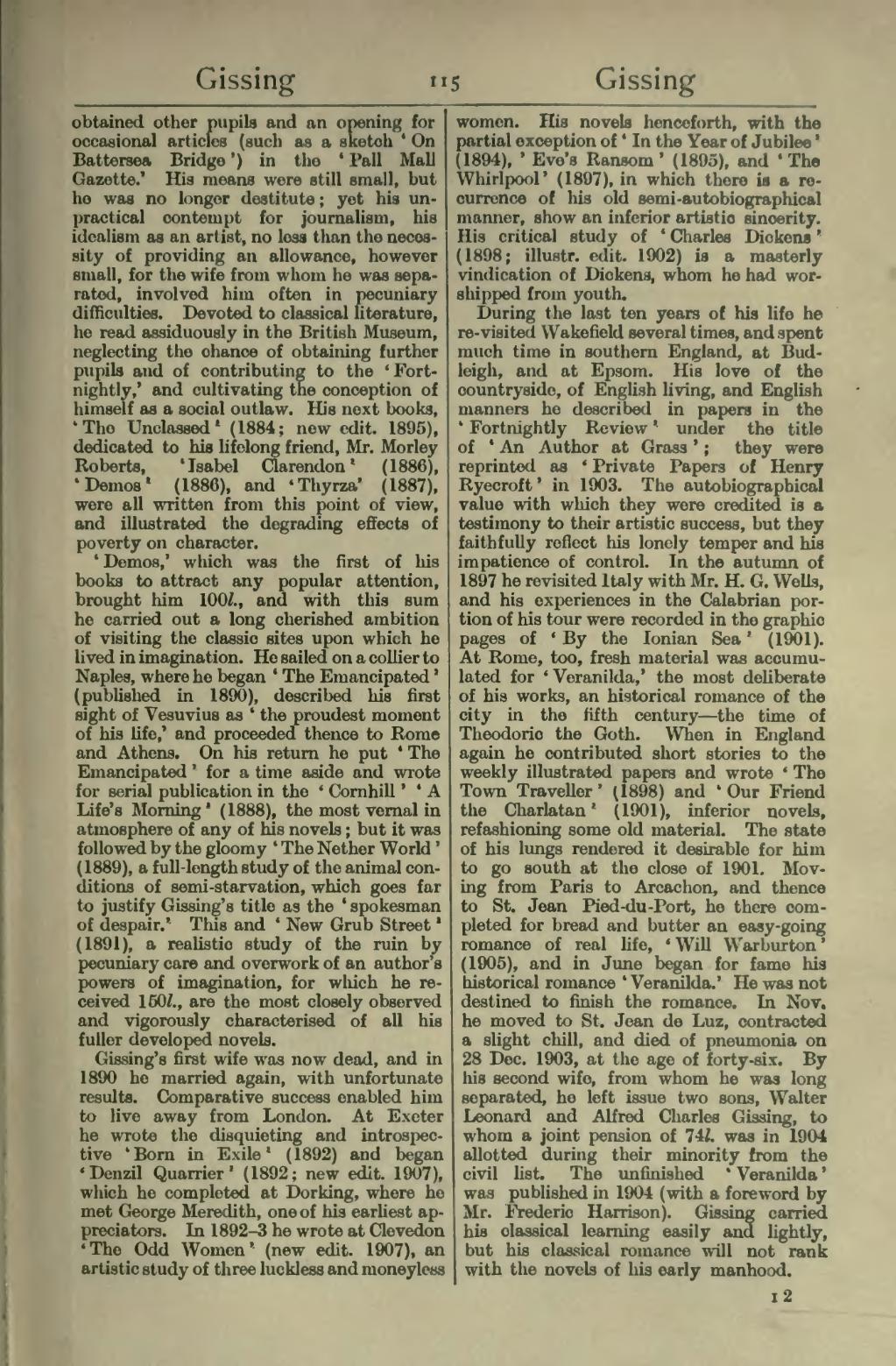obtained other pupils and an opening for occasional articles (such as a sketch 'On Battersea Bridge') in the 'Pall Mall Gazette.' His means were still small, but he was no longer destitute; yet his unpractical contempt for journalism, his idealism as an artist, no less than the necessity of providing an allowance, however small, for the wife from whom he was separated, involved him often in pecuniary difficulties. Devoted to classical literature, he read assiduously in the British Museum, neglecting the chance of obtaining further pupils and of contributing to the 'Fortnightly,' and cultivating the conception of himself as a social outlaw. His next books, 'The Unclassed' (1884; new edit. 1895), dedicated to his lifelong friend, Mr. Morley Roberts, 'Isabel Clarendon' (1886), 'Demos' (1886), and 'Thyrza' (1887), were all written from this point of view, and illustrated the degrading effects of poverty on character.
'Demos,' which was the first of his books to attract any popular attention, brought him 100l., and with this sum he carried out a long cherished ambition of visiting the classic sites upon which he lived in imagination. He sailed on a collier to Naples, where he began 'The Emancipated' (published in 1890), described Ms first sight of Vesuvius as 'the proudest moment of his life,' and proceeded thence to Rome and Athens. On his return he put 'The Emancipated' for a time aside and wrote for serial publication in the 'Cornhill ' 'A Life's Morning' (1888), the most vernal in atmosphere of any of his novels; but it was followed by the gloomy 'The Nether World' (1889), a full-length study of the animal conditions of semi-starvation, which goes far to justify Gissing's title as the 'spokesman of despair.' This and 'New Grub Street' (1891), a realistic study of the ruin by pecuniary care and overwork of an author's powers of imagination, for which he received 150l., are the most closely observed and vigorously characterised of all his fuller developed novels.
Gissing's first wife was now dead, and in 1890 he married again, with unfortunate results. Comparative success enabled him to live away from London. At Exeter he wrote the disquieting and introspective 'Born in Exile' (1892) and began 'Denzil Quarrier' (1892; new edit. 1907), which he completed at Dorking, where he met George Meredith, one of his earliest appreciators. In 1892-3 he wrote at Clevedon 'The Odd Women' (new edit. 1907), an artistic study of three luckless and moneyless women. His novels henceforth, with the partial exception of 'In the Year of Jubilee' (1894), 'Eve's Ransom' (1895), and 'The Whirlpool' (1897), in which there is a recurrence of his old semi-autobiographical manner, show an inferior artistic sincerity. His critical study of 'Charles Dickens' (1898; illustr. edit. 1902) is a masterly vindication of Dickens, whom he had worshipped from youth.
During the last ten years of his life he re-visited Wakefield several times, and spent much time in southern England, at Budleigh, and at Epsom. His love of the countryside, of English living, and English manners he described in papers in the 'Fortnightly Review' under the title of 'An Author at Grass'; they were reprinted as 'Private Papers of Henry Ryecroft' in 1903. The autobiographical value with which they were credited is a testimony to their artistic success, but they faithfully reflect his lonely temper and his impatience of control. In the autumn of 1897 he revisited Italy with Mr. H. G. Wells, and his experiences in the Calabrian portion of his tour were recorded in the graphic pages of 'By the Ionian Sea' (1901). At Rome, too, fresh material was accumulated for 'Veranilda,' the most deliberate of his works, an historical romance of the city in the fifth century — the time of Theodoric the Goth. When in England again he contributed short stories to the weekly illustrated papers and wrote 'The Town Traveller' (1898) and 'Our Friend the Charlatan' (1901), inferior novels, refashioning some old material. The state of his lungs rendered it desirable for him to go south at the close of 1901. Moving from Paris to Arcachon, and thence to St. Jean Pied-du-Port, he there completed for bread and butter an easy-going romance of real life, 'Will Warburton' (1905), and in June began for fame his historical romance 'Veranilda.' He was not destined to finish the romance. In Nov. he moved to St. Jean de Luz, contracted a slight chill, and died of pneumonia on 28 Dec. 1903, at the age of forty-six. By his second wife, from whom he was long separated, he left issue two sons, Walter Leonard and Alfred Charles Gissing, to whom a joint pension of 74l. was in 1904 allotted during their minority from the civil fist. The unfinished 'Veranilda' was published in 1904 (with a foreword by Mr. Frederic Harrison). Gissing carried his classical learning easily and lightly, but his classical romance will not rank with the novels of his early manhood.
